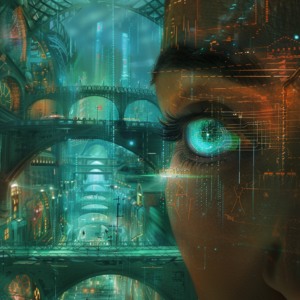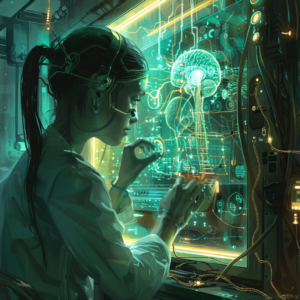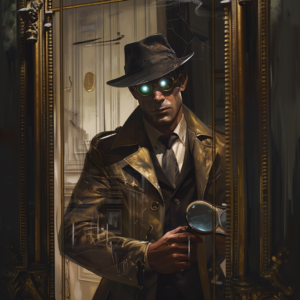
In the neon-lit streets of Nova City, where the buildings kissed the sky and holographic billboards lit up the night, the line between human and machine blurred. A secret group known only as Echo was at the heart of this sprawling metropolis. They were hackers, dreamers, rebels—augmented humans who dared use their transhumanist enhancements, such as neural laces and mechanical limbs, to fight corruption.
Aria, their leader, was a cipher with a mind like quantum computer algorithms. Once a sought-after neural programmer, she had left her corporate life behind. A state-of-the-art neural lace interwoven with her cortex amplified her natural abilities, making her a formidable hacker.
Her second-in-command, Orion, wore mechanical limbs, hidden compartments filled with nanobots, and an army of microscopic soldiers. His past as a combat engineer had imbued him with fierce resilience and a strategic mind.
Their base was an abandoned underground lab pulsing with the hum of servers. Each of them had their reasons to fight, personal tales of injustice that drove them. Each day, their acts of rebellion became bolder, their targets larger.
Echo planned to infiltrate the encrypted network of the city’s oppressive government. Aria’s fingers danced over holographic keyboards, her eyes a vibrant green, reflecting lines of code. She was orchestrating a symphony of disruption, and the entire city was her stage.
Orion, his mechanical fingers delicately assembling a swarm of nanobots, was set to deploy them into the city’s central hub. These microscopic soldiers were programmed to override the city’s surveillance systems, offering the team a precious window of opportunity.
When the moment arrived, it was like a cosmic event. Aria’s codes collided with the government’s firewalls, and Orion’s nanobots swept across the city’s circuits. The city held its breath, the usually buzzing neon lights dimmed, and the first breach was made.
Information flowed like a bursting dam, revealing corruption at the highest levels. The proof of the government’s sinister experiments on its citizens, their plans for total control under the guise of transhumanism, was laid bare for all the city to see.
In the aftermath of Echo’s most daring operation, the city was left to reckon with the truth. The hackers had not just exposed their leaders; they had sparked a revolution. Conversations around transhumanism took a drastic turn. People began to see the technology not as a tool of control but as a beacon of hope, a catalyst for change.
Transhumanism became the language of the revolution. The people of Nova City, now wary of their government’s intentions, began harnessing transhumanism’s power for themselves, using it to fight against the oppressive regime. Body enhancements, once symbols of status, were now seen as tools of liberation, allowing individuals to resist and challenge the government’s control. A wave of civil disobedience surged across the city. The hackers had succeeded, disrupting the status quo and sparking a movement for change.
As Aria watched the city she loved fight for its freedom, she couldn’t help but feel a sense of triumph. They were no longer spectators but players in the great game of societal change. The revolution had begun, and Echo was at its helm, steering Nova City towards a future they dared to dream of.
In the shimmering mirage of Nova City, technology and human existence are entwined into a fascinating symbiosis. Our protagonists, the Echo group, were far more than mere humans – they were the epitome of transhumanist philosophy. Their bodies and minds, enhanced with cutting-edge technology, were proof of humanity’s ceaseless quest to push beyond natural limits.
An intricate network of artificial neural networks is at the core of their abilities. These structures, woven into their biological cortex, mirrored the human brain’s functioning but with a much higher speed and efficiency. Borrowing principles from quantum computing, these neural networks operated on principles of superposition and entanglement, allowing multiple computational states to exist simultaneously, thus exponentially accelerating their information processing capabilities.
Aria’s neural lace, a thin mesh of electronic fibers, was a marvel of bioengineering and nanotechnology. It could self-integrate with her neural cortex, bridging the gap between her biological brain and digital data. This interface allowed her to intuitively access vast amounts of information and process complex algorithms in a fraction of a regular computer’s time.
On the other hand, Orion’s mechanical limbs and nanobots were a testament to advancements in robotics and material sciences. His limbs were composed of advanced alloys, designed to be lighter yet more robust than any natural limb. His nanobots, each a microcosm of engineering genius, could manipulate matter at an atomic level, making them versatile tools in many scenarios.
As our tale unfurls, it becomes evident that despite their enhanced capabilities, the Echo group grapples with the universal human problem: morality. Programmed with advanced artificial intelligence, their neural enhancements are capable of complex decision-making. Yet, they still need a moral compass. They exhibit a keen understanding of ethical principles, signifying the incorporation of machine ethics into their AI programming. This infusion of ethics into AI, based on established philosophical theories and social norms such as the principles of utilitarianism and human rights, is a rapidly evolving field in computer science.
Yet, the interplay between human intuition and algorithmic determinism presents an ongoing challenge. How much should they rely on their AI-driven logic, and when should human intuition take precedence? This tension between instinct and logic, human empathy, and AI impartiality underlines their actions and decisions, often leading to internal conflicts and debates within the group.
Thus, our story finds its pulsating rhythm in this captivating tableau of human resilience, technological prowess, and moral dilemmas. It is a story of artificial intelligence as a tool, not just for practical enhancement but as a mirror reflecting the depth of human values, the complexity of our ethics, and the intertwined destinies of humanity and technology.




